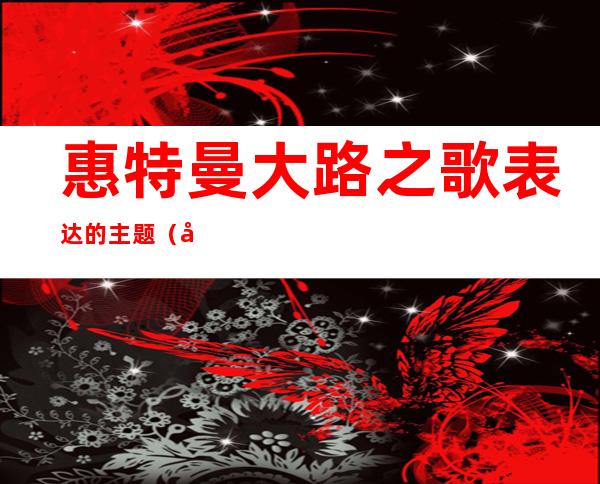惠特曼大路之歌表达的主题(大路之歌惠特曼原文英文)

这是在下21年前写就的第一篇乐评:马勒《大地之歌》 小泽征尔 波士顿交响乐团 1998(原文为英文)
继续小泽征尔系列。翻译出1998年加入Mahler List(全世界近400位马勒信徒的家园)之后发的第一篇音乐会观后感。文末有些言辞不当,很是得罪了List上的一些音乐评论家们。不打不成交么。
在下当时是自封的中国马勒迷代表,因为没有其他中国人长期参与。记得当时还有北京一个叫Peter Fang以及另外一位老兄,偶尔发言。好像Peter曾请了法国马勒专家Henry Louis de la Grange到北京搞讲座。
马勒《大地之歌》Ozawa/Norman/Heppner 波士顿交响乐团
1998/10/31 波士顿交响乐厅
英文原稿于1998/11/1日帖于Mahler List。
来自罗德岛的问候!
刚从波士顿返回,欣赏了波士顿交响乐团演出的马勒《大地之歌》,小泽征尔指挥,Jessye Norman和Ben Heppner独唱。下面是笔者作为一个马勒信徒和波交音乐会常客对本场音乐会的印象报告,并非音乐评论,因为在下不识谱儿,只是个人感受而已。
整个音乐会,绝大部分时间,尤其是最后5分钟之前,算是一个品质良好的演出。而最后的5分钟,将音乐艺术升华至令人身心皆怡,神情通透之上佳境界,灵光四溢,精彩伟大。
应该说,小泽对于歌者而言,是一个富于同情而善解人意的指挥。他对作品的总体结构更是有着意识明确的的把握与掌控。然而,据看过前几场演出的朋友评论,在一些乐队声响较大的地方,男高音几近被淹没。我对小泽的马勒演出史之了解,不超过以往的4年,看了他的马勒2,3,5,和6。曾经对他魔幻般的马勒2演绎(1996)激动不已。然而,赞德和波士顿爱乐的马勒2似乎更另我感动。小泽最近的马勒3和马勒6,好像于我触动不大。我收有他的马勒录音全集但并不经常造访。尽管如此,笔者还是丝毫热情不减地欣赏小泽。欲见小泽真功,必须看他的伯辽兹,拉威尔,德彪西,巴托克,或者斯特拉文斯基。今晚上半场的曲目是巴托克的《神奇的满大人》。小泽的解读堪称如鱼得水,音乐与姿势珠联璧合,赏心悦目。笔者无法得知到底小泽的马勒是进步了还是衰落了,然而,今晚,小泽领军的《大地之歌》很是值得激赏。
Heppner,唱得倒是英气勃发,青春洋溢。但是,大多数时间,尤其是第一乐章,他的声音似乎缺乏穿透力。也许,我们习惯了多声道录音里歌手们被单独突显夸张了的声音。即使在音场颇为亲切逼真的波士顿交响乐厅,此时以抒情男高音应工的Heppner,嗓音仍然显得相对微弱。比起今年早时在大都会歌剧院看他在《纽伦堡的名歌手》中的Walter,简直判若两人。在演唱间歇中,他禁不住地咳嗽数次,可以明显地看出他并不在最佳状态,也许犯感冒。
首席长笛非常出彩,婉转悠扬。代理首席双簧管算是说得过去。几位朋友曾对他在上周四一场的表现多有微词。今晚一观,不无道理。通常,笔者还是非常喜欢这位Wakao先生的,尤其是他在贝9中的卓越表现。但是,他的马勒并不能够如约寓情传神。这里的演奏需要的是更深的理解与同情。最后一个乐章中一段简短的大提琴独奏,如泣如诉,催人泪下。大提琴首席,老当益壮,不辱使命。
再看Jessye Norman。今晚之前,对其马勒录音(分别与小泽和海汀克合作),笔者并无甚等热情。窃以为其嗓音过于宽泛,对于马勒来说好像大一号。并且,搞不太清除她到底是高音还是中音。今晚她的头两首歌,音色比录音要圆润生动一些,但仍然给人一种浮云过眼的感觉,虚幻缥缈,稀疏流荡,偶尔光芒闪烁,终究少了些凝聚与穿透,并不“嘶咬抓挠”人,华美而不亲近。
Janet Baker女爵在百代的唱片制作人曾经称赞Baker有一种独特的能力,就是让每一位观众都感到她好像是专门在为他一个人演唱。而Norman今晚显然不是这样。她在歌唱,表演,非常具有表现力,但似乎并没有与观众在音乐上有深层次的交流。
然而,我对Norman的看法在最后分钟发生了彻底的转变。她的演绎终于征服了我。那断续相连的浅唱低吟,美得令人难以置信。仿佛马勒在自言自语,Norman完全融化在马勒的音乐里,她动情地对着自己唱,与观众保持着恰如其分的情感距离,安然平实,静谧祥和,“永远”“永远”淡淡地悄然逝去。温柔的震撼,伴随着的是醍醐灌顶般的愉悦启迪。我不禁突然意识到,这恋恋终曲,并不是对深情挚爱着的大地之凄然诀别,而是漫漫晋身梦寐以求的天国之荣光神梯。如此瞬间的启迪,立刻将我带回第一次看到马勒遗容模件时的场景,宁静而安详。Walter曾经说过,马勒寻找上帝,布鲁克纳找到了上帝。如果马勒就此歇笔,以《大地之歌》为第九,可能是一个圆满的结束。然而,作为马勒迷的我们,大概决不可能割舍后来的马勒9甚或马勒10。
再次重温天国之梦,不亦乐乎?!在回家的路上,又在车里听了Heppner在Bertini棒下演唱的《大地之歌》,也算弥补了他今晚状态不佳的缺憾。瞧,依现代的录音技术,我们每天都可以奔向天堂。
这篇报告,长篇大论,已经超出了笔者有限的评判能力,是第一次,也可能是最后一次。我发现我听得过于专注了,就像Mitropoulos所希望的观众必须全身心地认真倾听一样。这种高强度的分析性专注,使得对音乐的自然欣赏大打折扣。音乐,需要被感受,被体味,并不总是需要分析。过分的挑剔使人难以得到满足。那并不一定是什么好事。
音乐评论家的职业生涯通常是建立在摧毁音乐家的职业生涯上的。如果某篇评论不挑点毛病,好像就不深刻或者无趣。笔者冒昧斗胆揣测,音乐评论家们职业从事评论,是否是做音乐家前途无望呢,还是臆想成为来日之星呢?听的评论太多会把自己弄糊涂的。真正的音乐家,不解释,不道歉,只是做。爱乐者也只需听他们所喜欢听的音乐并且乐在其中就是了。听历愉快!
BSO DLVDE Seiji Ozawa/Jessye Norman/Ben Happner
1998/10/31 (Originally Posted to the Mahler List)
Greetings from Rhode Island. I just came back from BSO's performance of DLVDE with Jessye Norman and Ben Heppner, Seiji Ozawa conducting. The following is my report of the concert as a Mahler devotee and a regular BSO concert goer. It is not a music review and I don't read scores. It's just a personal reflection.
For most part of the performance until the last 5 minutes or so, it is
a good performance. Then it became a great, glorious performance.
First, Ozawa is a wondeful and sensitive accompanist to the singers. He has a great sense of structure with the work. As some listers observed based on earlier performances, though, in some loud orchestral passages, he did drown the tenor. I do not know the history of Ozawa's Mahler anything longer than the past 4 years. I attended his 2nd, 3rd, 5th, and 6th. I was moved by the spetacular performance of 2nd, although I think Zander and Boston Philharmonic were even more sensational. But I was not warm to his recent 3 and 6. I have his complete Mahler set, thought don't return to it very often.
Still, I like Seiji a whole lot. To see his best, you need to see him
in Berlioz, Ravel, Debussy, Bartok, and even Stravinsky. The first
half of tonight's concert featured Batork's miraculous mandarian.
Ozawa was satisfying both musically and visually. I don't know whether his Mahler was actually improving or declinging, but tonight, I like his leadership in DLVDE.
On Heppner, he did try to manage some youthful exuberance and fresh innocence into his singing. But for most part, especially the first
song, he's not projecting very well. Maybe we are used to recordings
which typically "feature" the voice so saliently though multi-channel
recordings. His lyrial tenor seemed small, even in the accoustically
intimate Symphony Hall, not at all matching the image I had of him in
Walter of Die Meistersinger at the Met earlier this year. He was
visibly coughing a couple times during the performance, suggesting
that he might be a bit under the weather or not at his best.
BSO principle flute played wonderfully and Assistant principle Oboe
(principle vacant) competently. The oboe was criticized I guess by
some reviews of Thursday's concert. I see it not groundless. I
generally like him, Mr. Wakao, in other performances, e.g., Beethoven
9th, but his playing in Mahler does not always effectively convey the
mood and message. More sympathic and sensitive playing ought to be expected. A very short passage on Cello in the last song played by BSO principle was wondeful.
Now Jessye Norman. Before the concert, I did not quite like her Mahler recordings with Ozawa and Haitink. I thought her voice to be too expansive and, big, for Mahler, and I constantly wonder whether she's really a soprano or mezzo. For her first two songs tonight, I sensed that the voice was actually sweeter than the recordings I heared.However, I still felt that the voice is more like a beautiful cloud,
expansive, sometime radiant, but not necessarily penetrating or
projecting. It seems to lack focus, or it doesn't bite. Beautiful but
not intimate.
Dame Janet Baker's producer at EMI once said that Dame Janet has a
unique capability in letting every member in the audience feel that
she is just singing for him or her. Jessye Norman was not like that.
She's singing, acting, performing, very expressive, but, to me, not
very musically communicative.
My take on her singing completely changed however during the last 5
minutes or so. Her interpretation finally won me over. The soft
passages were unbelievablly rendered, singing to herself, totally
absorbed, and maintaining just the right emotional distance from the
audience, serene, calm, and peacfully fading away. It shocked me with
delightful revelation. It made me suddenly realize that it really was
not a farewell to the beloved earth but a glorious passage to heaven.
Such a realizaion reminded me the mythical feeling when I first saw
the image of Mahler's death mask, serene and peaceful. Walter once
said that Mahler seeks god and Bruckner already found god. If Mahler
stopped here, making DLVDE his Nith, he would be done, perfectly.
But all of us on the List would perhaps won't live without the later
Ninth and many the 10th. Isn't it wonderful to go to heaven twice? On
my way driving home, I listened to Gary Bertini in DLVDE, featuring
Heppner as tenor. This perhaps compensated for his sub par performance tonight. With modern technology, you can go to heaven on a daily basis!
This report, very lengthy to me given my limited critical faculty,
will be the first and the last one. For I find myself listened so
hard, as Mitropolous would like his audience to, it discounted my pure
listening pleasure. Music has to be felt and experienced, not always
analyzed. Being too critical gets one difficult to satisfy. And that
is not necessarily a good thing.
Music critics build careers on knocking down careers.
If a review does not falut someone or something, it is not
interesting. Dare I say many critics are drop-out or rejected
musicians or those who fancy themselves as musician-star wannabes.
Listening to too much critic gets one confused. Real musicians don't
explain, don't apologize, they just do it. Listeners should just
listen what THEY like and enjoy. Happy listening.
